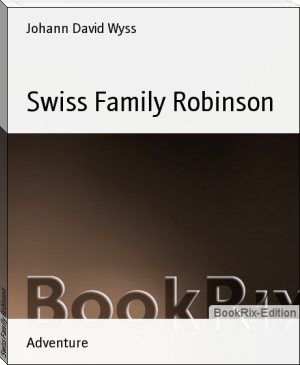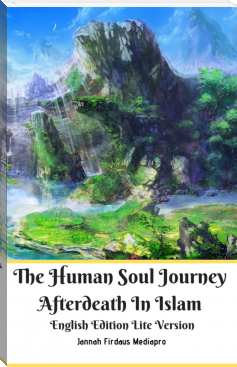Swiss Family Robinson - Johann David Wyss (poetry books to read txt) 📗

- Author: Johann David Wyss
- Performer: -
Book online «Swiss Family Robinson - Johann David Wyss (poetry books to read txt) 📗». Author Johann David Wyss
packed together, and ready to set up.
When the great affairs were settled, we still found in all directions
work to be done. Shelves, tables, benches, movable steps, cupboards,
pegs, door-handles and bolts—there seemed no end to our requirements,
and we often thought of the enormous amount of work necessary to
maintain the comforts and conveniences of life which at home we had
received as matters of course.
But in reality, the more there was to do the better; and I never
ceased contriving fresh improvements, being fully aware of the
importance of constant employment as a means of strengthening and
maintaining the health of mind and body. This, indeed, with a
consciousness of continual progress toward a desirable end, is found to
constitute the main element of happiness.
Our rocky home was greatly improved by a wide porch which I made along
the whole front of our rooms and entrances, by levelling the ground to
form a terrace, and sheltering it with a verandah of bamboo, supported
by pillars of the same.
Ernest and Franz were highly successful as librarians. The books, when
unpacked and arranged, proved to be a most valuable collection, capable
of affording every sort of educational advantage.
Besides a variety of books of voyages, travels, divinity, and natural
history (several containing fine coloured illustrations), there were
histories and scientific works, as well as standard fictions in several
languages; also a good assortment of maps, charts, mathematical and
astronomical instruments, and an excellent pair of globes.
I foresaw much interesting study on discovering that we possessed the
grammars and dictionaries of a great many languages, a subject for
which we all had a taste. With French we were well acquainted. Fritz
and
Ernest had begun to learn English at school, and made further progress
during a visit to England. Their mother, who had once been intimate
with a Dutch family, could speak that language pretty well.
After a great deal of discussion, we agreed to study different
languages, so that in the event of meeting with people of other
nations, there should be at least one of the family able to
communicate with them.
All determined to improve our knowledge of German and French. The two
elder boys were to study English and Dutch with their mother.
Ernest, already possessing considerable knowledge of Latin, wished to
continue to study it, so as to be able to make use of the many works on
natural history and medicine written in that language.
Jack announced that he meant to learn Spanish `because it sounded so
grand and imposing’.
I myself was interested in the Malay language, knowing it to be so
widely spoken in the islands of the Eastern Seas, and thinking it as
likely as any other to be useful to us.
Our family circle by and by represented Babel in miniature, for scraps
and fragments of all these tongues kept buzzing about our ears from
morning to night, each sporting his newly acquired word or sentence on
every possible occasion, propounding idioms and peculiar expressions
like riddles, to puzzle the rest.
In this way, the labour of learning was very considerably lightened,
and everyone came to know a few words of each language.
Occasionally we amused ourselves by opening chests and packages
hitherto untouched, and brought unexpected treasures to
light—mirrors, wardrobes, a pair of console tables with polished
marble tops, elegant writing tables and handsome chairs, clocks of
various descriptions, a musical-box, and a chronometer were found; and
by degrees our abode was fitted up like a palace, so that sometimes we
wondered at ourselves, and felt as though we were strutting about in
borrowed plumes.
The children begged me to decide on a name for our salt cave dwelling,
and that of Rockburg was chosen unanimously.
The weeks of imprisonment passed so rapidly that no one found time hang
heavy on his hands.
Books occupied me so much that but little carpentering was done, yet I
made a yoke for the oxen, a pair of cotton-wool carders, and a
spinning-wheel for my wife.
As the rainy season drew to a close, the weather for a while became
wilder, and the storms fiercer than ever. Thunder roared, lightning
blazed, torrents rushed towards the sea, which came in raging billows
to meet them, lashed to fury by the tempests of wind which swept the
surface of the deep.
The uproar of the elements came to an end at last. Nature resumed her
attitude of repose, her smiling aspect of peaceful beauty; and soon all
traces of the ravages of floods and storms would disappear beneath the
luxuriant vegetation of the tropics.
Gladly quitting the sheltering walls of Rockburg to roam once more in
the open air, we crossed Jackal River, for a walk along the coast, and
presently Fritz with his sharp eyes observed something on the small
island near Flamingo Marsh, which was, he said, long and rounded,
resembling a boat bottom upwards.
Examining it with the telescope, I could form no other conjecture, and
we resolved to make it the object of an excursion next day, being
delighted to resume our old habit of starting in pursuit of adventure.
The boat was accordingly got in readiness; it required some repairs,
and fresh pitching, and then we made for the point of interest,
indulging in a variety of surmises as to what we should find.
It proved to be a huge stranded whale. The island being steep and
rocky, it was necessary to be careful; but we found a landing-place on
the further side. The boys hurried by the nearest way to the beach
where lay the monster of the deep, while I clambered to the highest
point of the islet, which commanded a view of the mainland from
Rockburg to Falconhurst.
On rejoining my sons, I found them only halfway to the great fish, and
as I drew near they shouted in high glee:
`Oh, father, just look at the glorious shells and coral branches we are
finding! How does it happen that there are such quantities?’
`Only consider how the recent storms have stirred the ocean to its
depths! No doubt thousands of shellfish have been detached from their
rocks and dashed in all direction by the waves, which have thrown
ashore even so huge a creature as the whale yonder.’
`Yes; isn’t he a frightful great brute!’ cried Fritz. `Ever so much
larger than he seemed from a distance. The worst of it is, one does not
well see what use to make of the huge carcase.’
`Why, make train oil, to be sure,’ said Ernest. `I can’t say he’s a
beauty, though, and it is much pleasanter to gather these lovely
shells, than to cut up blubber.’
`Well, let us amuse ourselves with them for the present,’ said I, `but
in the afternoon, when the sea is calmer, we will return with the
necessary implements, and see if we can turn the stranded whale to good
account.’
We were soon ready to return to the boat, but Ernest had a fancy for
remaining alone on the island till we came back, and asked my
permission to do so, that he might experience, for an hour or two, the
sensations of Robinson Crusoe.
To this, however, I would not consent, assuring him that our fate, as a
solitary family, gave him quite sufficient idea of shipwreck on an
uninhabited island, and that his lively imagination must supply the
rest.
The boys found it hard work to row back, and began to beg of me to
exert my wonderful inventive powers in contriving some kind of rowing
machine.
`You lazy fellows!’ returned I. `Give me the great clockwork out of a
church tower, perhaps I might be able to relieve your labours.’
`Oh father!’ cried Fritz. `Don’t you know there are iron wheels in the
clockwork of the large kitchen-jacks? I’m sure mother would give them
up, and you could make something out of them, could you not?’
`By the time I have manufactured a rowing-machine out of a
roasting-jack, I think your arms will be pretty well inured to the use
of your oars! However, I am far from despising the hint, my dear
Fritz.’
`Is coral of any use?’ demanded Jack suddenly.
`In former times it was pounded and used by chemists; but it is now
chiefly used for various ornaments, and made into beads for necklaces
et cetera. As such, it is greatly prized by savages, and were we to
fall in with natives, we might very possibly find a store of coral
useful in bartering with them.
`For the present we will arrange these treasures of the deep in our
library, and make them the beginning of a Museum of Natural History,
which will afford us equal pleasure and instruction.’
`One might almost say that coral belongs at once to the animal,
vegetable, and mineral kingdoms,’ remarked Fritz; `it is hard like
stone, it has stems and branches like a shrub, and I believe tiny
insects inhabit the cells, do they not, father?’
`You are right, Fritz; coral consists of the calcereous cells of
minute animals, so built up as to form a tree-like structure.
`The coral fishery gives employment to many men in the Persian Gulf,
the Mediterranean Sea, and other places. The instrument commonly used
consists of two heavy beams of wood, secured together at right angles,
and loaded with stones. Hemp and netting are attached to the under side
of the beams, to the middle of which is fastened one end of a strong
rope, by which the apparatus is let down from a boat, and guided to the
spots where the coral is most abundant.
`The branches of the coral become entangled in the hemp and network;
they are broken off from the rock, and are drawn to the surface of the
water.
`Left undisturbed, these coral insects, labouring incessantly, raise
foundations, on which, in course of time, fertile islands appear,
clothed with verdure, and inhabited by man.’
`Why father, here we are at the landing-place!’ exclaimed Jack.
`It has seemed quite easy to pull since you began to tell us such
interesting things.’
`Very interesting, indeed; but did you notice that the wind had
changed, Jack?’ remarked Ernest as he shipped his oar.
The animated recital of our adventures, the sight of the lovely shells
and corals, and the proposed work for the afternoon, inspired my wife
and Franz with a great wish to accompany us.
To this I gladly consented, only stipulating that we should go
provided with food, water and a compass. `For,’ said I, `the sea has
only just ceased from its raging, and being at the best of times of
uncertain and capricious nature, we may chance to be detained on the
island, or forced to land at a considerable distance from home.’
Dinner was quickly dispatched, and preparations set on foot. The more
oil we could obtain the better, for a great deal was used in the large
lantern which burnt day and night in the recesses of the cave;
therefore all available casks and barrels were pressed into the
service; many, of course, once full of pickled herrings, potted pigeons
and other winter stores, were now empty, and we took a goodly fleet of
these in tow.
Knives, hatchets, and the boys’ climbing buskins, were put on board,
and we set forth, the labour of the oar being greater than ever, now
that our freight was so much increased.
The sea being calm, and the tide suiting better, we found it easy to
land close to the whale; my first care was to place the boat,





Comments (0)